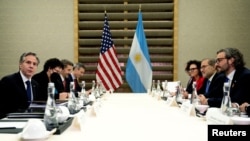The war in Ukraine and its impact on energy and food supplies dominated G-20 talks Friday in Bali.
The G-20 host country called on ministers to “find a way forward” in discussing the war and its impact on rising food and energy prices.
"It is our responsibility to end the war sooner rather than later and settle our differences at the negotiating table, not at the battlefield," Indonesian Foreign Minister Retno Marsudi said at the opening of the meeting, invoking the U.N. charter to urge multilateralism and trust.
Foreign ministers shared concerns about getting grain shipments out of Ukraine and avoiding devastating food shortages in Africa, the Middle East and elsewhere. But talks were marked by sharp tension: U.S. Secretary of State Antony Blinken and Russian Foreign Minister Sergey Lavrov sat at the same table, though they did not speak directly.
Lavrov accused Western ministers of straying “almost immediately, as soon as they took the floor, to the frenzied criticism of the Russian Federation in connection with the situation in Ukraine.”
“You know, it was not us who abandoned all contacts,” Lavrov told reporters after the first session. “It was the United States … and we are not running after anybody suggesting meetings. If they don’t want to talk, it’s their choice.”
Lavrov walked out of the meetings twice Friday – first, as German Foreign Minister Annalena Baerbock addressed a session on strengthening multilateralism, and second just before Ukraine’s foreign minister, Dmytro Kuleba, addressed the session on food and energy security via video link.
At a plenary session, U.S. Secretary of State Antony Blinken urged Moscow to release Ukrainian grain to the world, according to a Western official.
“He addressed Russia directly, saying, ‘To our Russian colleagues: Ukraine is not your country. Its grain is not your grain. Why are you blocking the ports? You should let the grain out,’” the official said.
Lavrov was not in the room when U.S. Secretary of State Antony Blinken spoke.
Agencies warn of looming famine
The meetings follow the release of the latest World Food Program (WFP) report Wednesday. It shows a decline in global efforts to eliminate hunger and malnutrition.
Up to 828 million people, or nearly 10% of the world's population, were affected by hunger last year, 46 million more than in 2020 and 150 million more than in 2019, agencies, including the WFP, Food and Agriculture Organization and World Health Organization said in the 2022 edition of the U.N. food security and nutrition report.
“There is a real danger these numbers will climb even higher in the months ahead," said WFP Executive Director David Beasley, adding that climbing prices of food, fuel and fertilizer stemming from the Russia-Ukraine war threaten to push countries into famine.
Ukraine’s agriculture ministry said Friday that in most regions of the country, farmers have begun the early harvest of wheat and legumes, gathering more than a million tons of grain so far, the Kyiv Independent media outlet reported.
Earlier this week, Ukrainian President Volodymyr Zelenskyy said he expected up to 60 million tons of grain to be harvested by fall, and that if blockades are not lifted, Ukraine will be in “a really difficult” situation.






